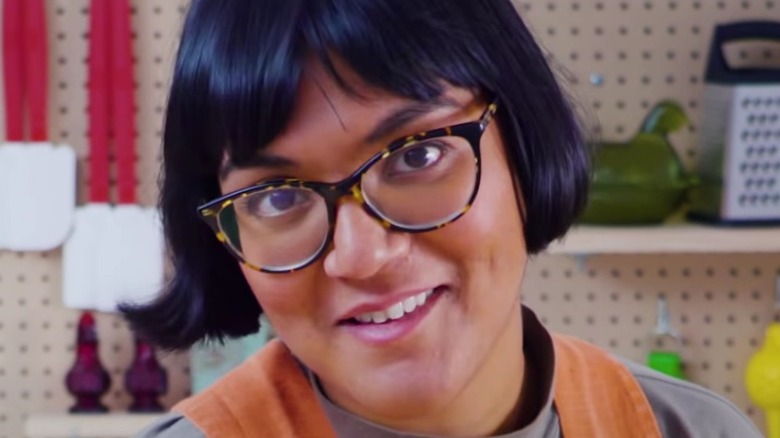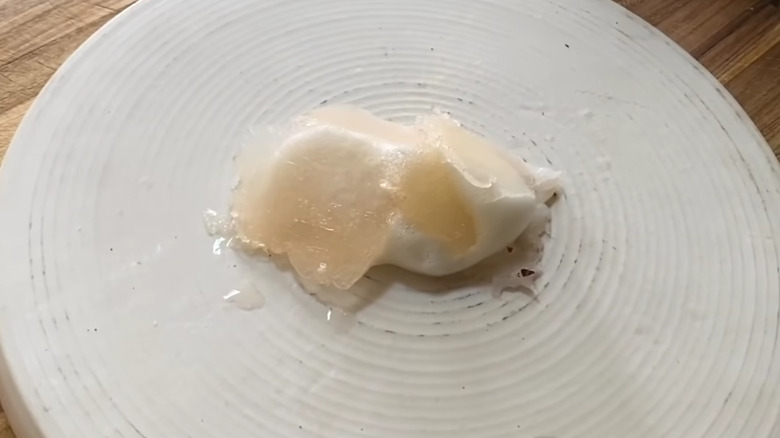These Are The 3 Dishes Sohla El-Waylly Says Define Her Life
Sohla El-Waylly used to work at the Cheesecake Factory. "Briefly. I was a hostess," she told NPR earlier this year. And while the chef has worked in many a fine dining restaurant during her career, nothing really holds a candle to the Factory. "It's like our Colosseum when you walk into a Cheesecake Factory," she told the interviewer, who couldn't stop laughing. "I feel like there's always different shades of taupe." It's El-Waylly's quirky humor and irreverent observations that drew audiences to her in the first place; even when they weren't necessarily her audiences. Until last year, El-Waylly was a staff member at Bon Appétit, where she cross-tested recipes and occasionally appeared on-screen during colleagues' videos for "Bon Appétit's Test Kitchen" (via Vulture). When it became clear that the chef was making far less money at Bon Appétit than her white, male colleagues (despite the fact that she had more experience, ability, and, frankly, personality), El-Waylly left "Test Kitchen" for greener (read: less racist) pastures.
When New York Times Cooking caught up with El-Waylly and asked her to share three dishes that define her life (via YouTube), no one would have blamed her had she decided to go with a vengeance-forward dish or two; salty and scorned, maybe something that leaves a bitter aftertaste in your mouth. Instead, the dishes that define El-Waylly's life are just like the chef herself: clever, comforting, and with just enough spice to keep you on your toes.
Something old, something new
For her first dish, El-Waylly explains that, as a child, one of her favorite meals was her mother's chicken korma ... in between two slices of white bread. In the New York Times Cooking video, the chef demonstrates how she would pull big, meaty chunks of chicken out of the korma, dress them with a bit of sauce, and put the mix on some squishy white bread. Slathering the bread with mayonnaise ("edge-to-edge") is important, but so is cutting off the crusts, if you want to go "full nostalgia," as El-Waylly calls it. The resulting sandwich should be cut into triangles for maximum effect, at which point you've got yourself a chicken korma sandwich to beat the band. "I think there was six months of my childhood where it was the only thing I would eat," El-Waylly admits. She goes on to defend her younger self's dietary decisions: "Carbs always make everyone feel better!"
Another dish El-Waylly cooks is more of a nod to her adult life: fried chicken with chile oil and spice dust. One of the chef's favorite meals from her days as a restaurateur, El-Waylly dry brines her chicken for two days, before dredging it in starches and deep-frying it in a skillet (to let the steam escape, and allow the skin to adhere properly). The chef explains that when she and her husband ran their own restaurant, this dish became so popular that by the time they closed the place down, it had basically turned into a fried chicken restaurant.
Something fancy-schmancy, too
The other dish that defines El-Waylly's life is equal parts silly and serious, so it makes sense that it would appeal to a chef who is both light-hearted and level-headed. Halibut crudo with a citrusy foam is a modern dish – one that El-Waylly learned during culinary school when she was paying the bills by working at fancy-schmancy restaurants. El-Waylly gives a sly smirk in the video as she explains that showing us how to make a dish like this one is "filled with techniques that you'll never need in real life," like blending lemon and lime juices with xanthan gum and versawhip powder to make foam.
Using the liquid from a ceviche (called leche de tigre) to make an ice block, El-Waylly then cuts two slices of fresh halibut and uses an upside-down plate to create a very modern, minimalist presentation of a halibut crudo that looks delicately delicious. But lest you think that cooking (or eating) such complicated, high-brow food is stuffy and elitist, El-Waylly is here to reassure you that it's okay. "This kind of food is ridiculous," she says, taking a bite of the halibut, "but that doesn't mean it's bad. It's just ... it's a little stupid."


